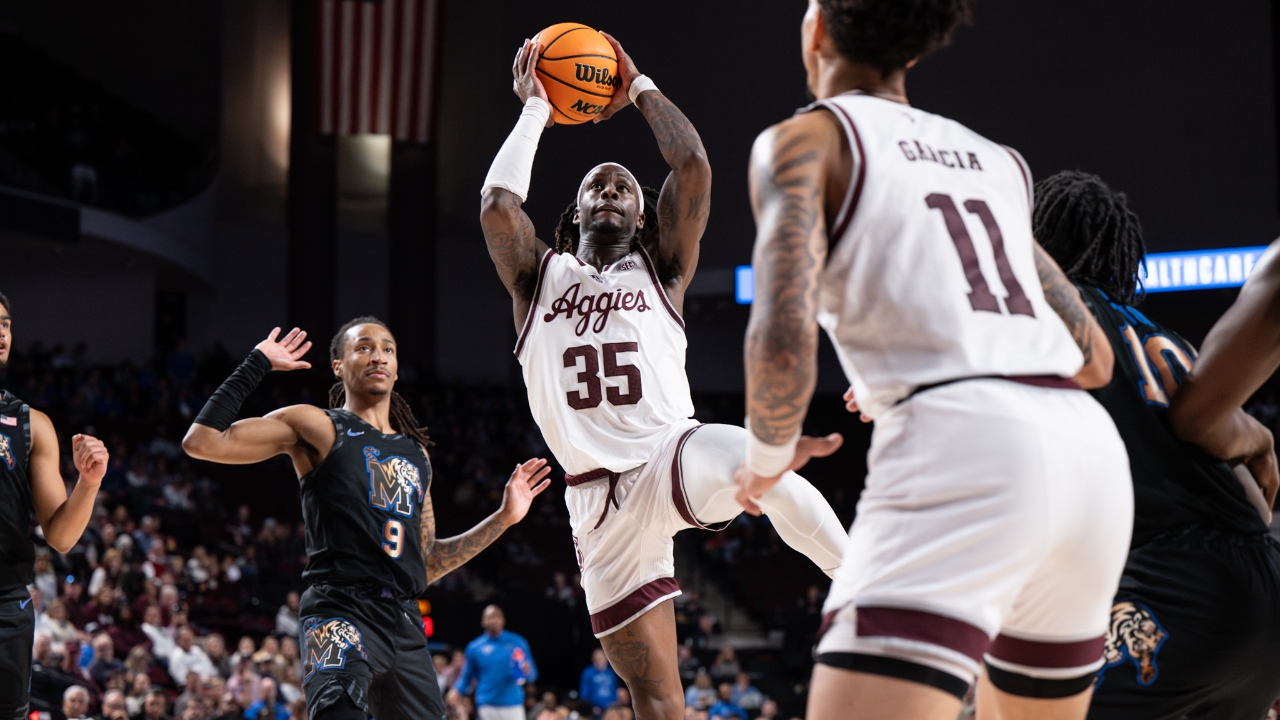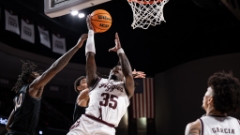
Memphis denies No. 21 Texas A&M's way-too-late comeback attempt
The big stage was the setting for a big disappointment.
No. 21 Texas A&M (7-3) hoped to notch arguably its most notable victory of the basketball season on Sunday at Reed Arena.
Instead, the Aggies were too inaccurate and too inconsistent before losing to Memphis, 81-75, in a game that wasn’t really that close.
A&M hit five of its final seven shots to make a furious rally in the last two minutes but was never really in a position to complete the comeback.
The loss snapped a 14-game home-court winning streak. The Aggies had not lost at Reed since falling, 67-62, to Wofford on Dec. 20 last season.
“They’re just disappointed,” A&M head coach Buzz Williams said of his team’s postgame frame of mind. “They’re not backing away from being accountable. They’re not blaming anyone. They’re not complaining. They’re not trying to defend their position. They know.”
They know they didn’t play to their usual standards.
A&M shot just 39.1 percent from the field and 18.2 percent (6-for-33) from 3-point range. The Aggies had 12 turnovers and were outrebounded 37-30. They fouled too often, and Memphis capitalized by converting 22-of-29 free throws.

Manny Obaseki came in off the bench to score 21 points, and Tyrece “Boots” Radford returned from a three-game absence. But they could not compensate for the offensive struggles of star guard Wade Taylor IV and forward Henry Coleman III.
Taylor scored just nine points while hitting just 3-for-14 from the field. Additionally, he was 0-for-9 from 3-point range. Coleman only took five shots and finished with six points.
That was the plan set by Memphis head coach Penny Hardaway, who schemed to neutralize A&M’s top two players, especially Taylor, who routinely faced double-teams.
“Early on, we double-teamed him right away and made him get off the ball,” Hardaway said. “He’s such a willing passer, which was good for us because he advanced the ball and got it to (Andersson) Garcia and those guys. We wanted those guys to be the play-makers and not him. He’s such a terrific guard.”
That strategy proved successful for Memphis as it forced Taylor into five turnovers.
But Williams pointed out A&M’s play on the defensive end was more problematic.
“We need him to be better offensively. He knows that,” Williams said. “Our offensive numbers … they were fine. We just turned the ball over too much. We shot more balls than they did. We fouled too often. But we didn’t get enough stops. Their offensive numbers were distinctly better. That’s as much our defense as it is how did IV play, offensively.”
The Aggies could not contain Memphis forward David Jones, who scored 29 points, 21 of which came in the first half.
“We allowed him to be comfortable,” Obaseki said. “We just kind of floated around a little. We weren’t really trying to contain him with urgency. We let him get hot.”’
The Aggies also struggled with guard Jahvon Quinerly, who had 24. With them leading the way, the Tigers shot 48.1 percent from the field and converted nine times from 3-point range.
They enabled Memphis to control play almost from the outset. The Tigers trailed for less than two minutes of the game, were never behind by more than three points and led by as many as 14 at one point.
The Tigers closed the first half on a 9-0 run to take a 38-29 lead into the break.
A&M pulled within 45-43 on a layup by Radford, but the Aggies committed six turnovers in the ensuing 4:16. That enabled Memphis to take a 57-45 lead.
Obaseki led a charge to bring the Aggies within 59-53 with 10:07 to play. But Quinerly and guard Caleb Mills combined for 15 points in about five minutes to propel Memphis to a 75-61 lead.
The Tigers maintained a 10-point advantage with less than a minute to play. Obaseki scored a layup and a 3-pointer in the final 20 seconds to make the score closer than it was.
That showing was alarming in itself, but also worrisome with a clash against No. 3 Houston looming next Saturday.
To bounce back against Houston, the Aggies must figure out what went wrong against Memphis.
Radford seemed to have already figured that part out.
“I just think we weren’t ourselves,” he said. “Our energy wasn’t there. That’s just something we have to take on ourselves to do better.”